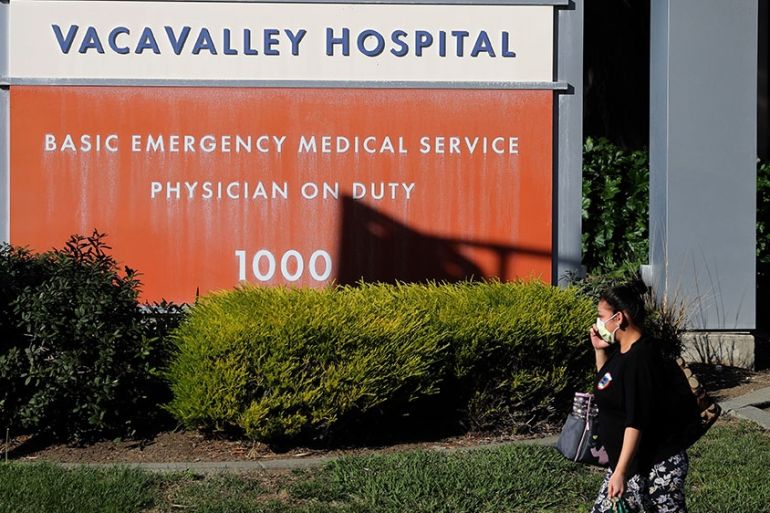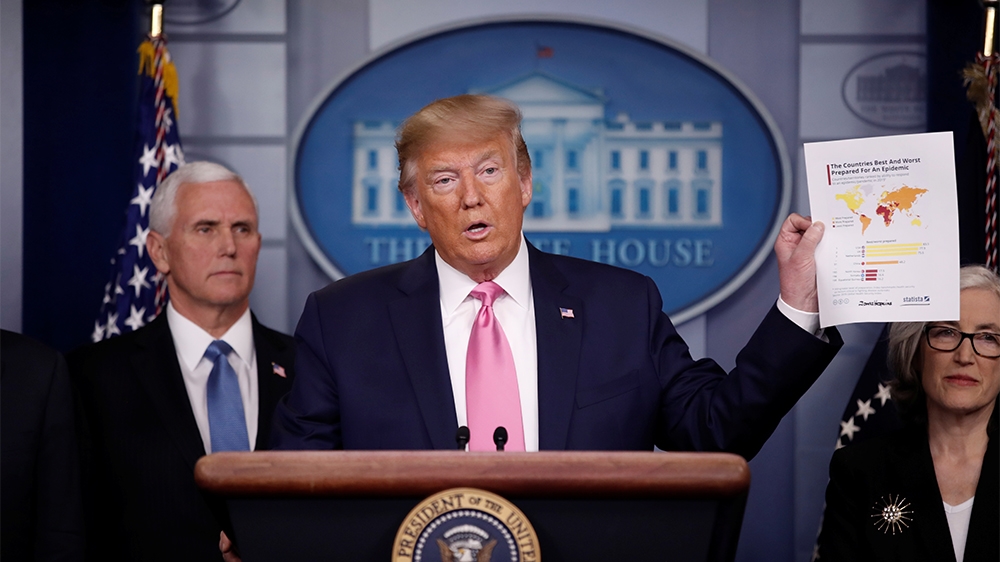First US coronavirus case of unknown origin marks ‘turning point’
Officials are frustrated over access to testing after possible first COVID-19 ‘community spread’ case in the US.

Officials in California expressed frustration on Thursday over access to coronavirus testing kits after the first case of the respiratory disease of unknown origin was diagnosed in the United States, prompting fears of “community spread”.
On Wednesday, the US Centers for Disease Control and Prevention (CDC) announced that a California patient who contracted COVID-19 did not have relevant travel history or exposure to another individual with the virus.
Keep reading
list of 3 itemsTimeline: How the new coronavirus spread
What happens if you catch the new coronavirus?
The case in California’s Solano County brought the total number of COVID-19 cases in the US to 60, including 45 cases among those who were repatriated, the CDC said.
While the US has seen a relatively few number of cases, health experts say the latest development marks a possible turning point, with fears the virus could spread further.
“I expect that we are going to start seeing some community-level transmission, in pockets across the country,” said Peter Jay Hotez, professor and dean at the National School of Tropical Medicine, in Houston, Texas.
“Whether or not it expands beyond that and becomes pervasive across the nation, that’s the unknown,” he told Al Jazeera.
The coronavirus outbreak, which originated in China, has spread to 44 countries around the world, affected markets, suspended flights and shuttered schools. It has infected more than 82,000 people and killed over 3,000 – mostly in China.
Hotez says faster confirmation of coronavirus infection is crucial to a rapid response by local health authorities and to ensure the safety of both patients and healthcare workers.
“Preparedness is primarily done at the local level, many people think the CDC is in charge of preparedness, but in fact, it is done throughout the various counties and local health departments,” he said.
Testing delayed for four days
Officials say testing was previously done by the CDC in their headquarters in Atlanta, Georgia, which was delaying the diagnosis process by at least a day.
In the recent California case, the patient was brought to UC Davis Medical Center on February 19, but testing was delayed for four days, because the CDC said the patient “did not fit the existing CDC criteria” for the virus, according to a hospital press release.
“We need to start testing in our communities and we need to fix our testing issues, and we need to do this now,” California Representative Ami Bera said during US House of Representatives committee hearing dedicated to addressing coronavirus.
California Governor Gavin Newsom said on Thursday the state currently had about 200 test kits, an “inadequate” number, but that he is in contact with federal agencies who have promised to send more kits in the coming days.
Health and Human Services Secretary Alex Azar told a US House of Representatives committee on Thursday that at least 40 public health labs were now able to test specimens for coronavirus, a number that could double by Friday.
But funding to confront the pandemic has turned into a political issue in the US, which will hold presidential elections in November. Trump, a Republican, asked Congress for $2.5bn, but Democrats said the amount is insufficient and have called for $8.5bn.
Amid a stock market slump over fears of the virus’s spread, Trump on Wednesday sought to quell concerns.
“I don’t think it’s inevitable,” Trump told reporters when asked about the possibility of a larger outbreak in the US.
“It probably will. It possibly will. It could be at a very small level or it could be at a larger level,” he added as he announced that Vice President Mike Pence would oversee the federal government’s effort to contain the virus. “Whatever happens, we’re totally prepared.”

But health officials say that preparing for the possibility of community spread of the virus may prove difficult.
“We do not have a secret pathway to protect people. Most of the protections that we are using fall into the category of non-pharmaceutical intervention: personal, community and environmental,” Michael Wilkes, Professor of Medicine and Global Health at UC Davis told Al Jazeera.
Personal intervention, Wilkes said, involves individuals taking precautions to protect themselves from contracting the virus, as well as ensuring they do not infect others, by seeking medical attention and isolating themselves if they suspect they have symptoms.
Community measures include cancelling large gatherings of people such as sporting and music events. While environmental involves sanitisation of public spaces.
The virus can cause fever, coughing, wheezing and pneumonia. Health officials say, like the flu, it spreads mainly from droplets when an infected person coughs or sneezes, and affects people in different ways.
Wilkes says not everyone who gets coronavirus will suffer from severe illness and evidence shows that four out of five people infected suffer from relatively minor illness. He adds that although the spread of the virus poses a serious risk to public health, he also worries about the effect it may have on society.
“We are following the evidence and we are doing what needs to get done medically, but the biggest battle we have is fear,” Wilkes said.

As for the Solano County, California case, officials say they are attempting to locate anyone who may have come into contact with the patient. The county also declared a state of emergency.
California Governor Newsom declined to declare a statewide emergency and said: “People should go about their day-to-day lives with common sense. I don’t want to instil any sense of new anxiety.”
With additional reporting by William Roberts in Washington, DC.